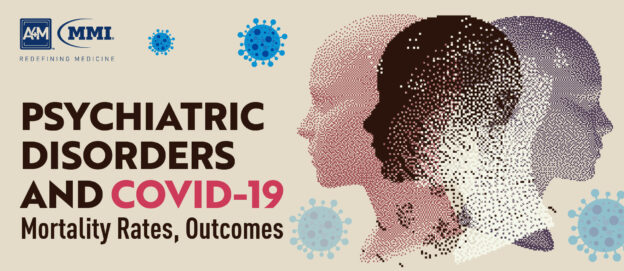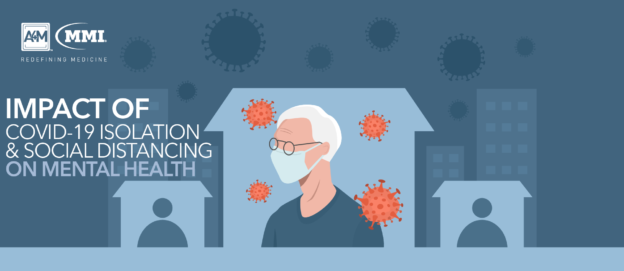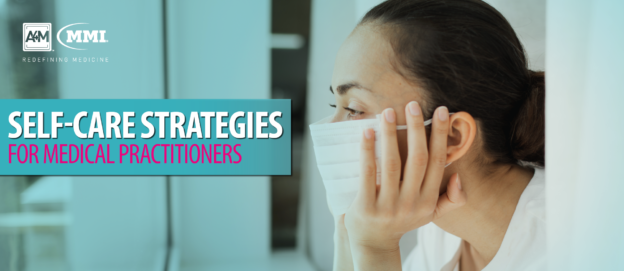Psychiatric disorders have a documented association with lower life expectancy – in some cases shortening lifespan by as much as 10 years – as well as increased risk of comorbid medical conditions. In light of the persisting COVID-19 public health crisis, experts are concerned that psychiatric comorbidity may increase virus-related mortality and predispose patients to poorer outcomes.
Ongoing and emerging research efforts aim to investigate the implications of prior psychiatric diagnoses on COVID-19-related mortality and health outcomes. According to data from a recent Yale University study, patients suffering from mental illnesses may face a higher risk for severe COVID-19 outcomes including death.
Psychiatric Comorbidity and COVID-19 Mortality
Researchers from the Yale University School of Medicine evaluated data obtained from the Yale New Haven Health System. Overall, the study included clinical data from 1,685 patients hospitalized with COVID-19 infection between February 15 and April 25, 2020.
Within that cohort, those who had been diagnosed with prior psychiatric disorders had a significantly elevated mortality risk compared with patients without a diagnosis after controlling for demographic characteristics, comorbidities, and hospital location. Of the 1,685 total participants, 473 (28%) received psychiatric diagnoses prior to hospitalization. This group was significantly older and more likely to be female, non-Hispanic white, and to have medical comorbidities. Overall, 318 patients or nearly 19% of the cohort died. The highest risk for COVID-19 mortality was reported among patients with a psychiatric diagnoses at 2 weeks after their index hospitalization, as well as at 3 and 4 weeks.
South Korean Cohort Study
In a similar study conducted by South Korean researchers, a cohort of patients with mental illness did not have an increased risk for testing positive for COVID-19 compared with the general population. However, the findings, published in Lancet Psychiatry, reveal that patients with a severe mental illness diagnosis had a greater risk of severe COVID-19 outcomes – including death, intensive care unit admission, and use of mechanical ventilation.
In this study cohort, groups with and without mental illness were matched demographically and by the presence of comorbid conditions.
Association Between Psychiatric Diagnosis and COVID-19 Outcomes
The latest studies are the first to characterize the association of psychiatric diagnosis with COVID-19 mortality. Their findings are similar to previous scientific results, confirming that individuals with comorbid psychiatric and medical diagnoses had poorer outcomes and higher mortality rates. However, the reasons underlying this association remain unclear at this time.
“Psychiatric symptoms may arise as a marker of systemic pathophysiologic processes, such as inflammation, that may, in turn, predispose to mortality,” the U.S. study’s authors wrote in the research letter. “Similarly, psychiatric disorders may augment systemic inflammation and compromise the function of the immune system, while psychotropic medications may also be associated with mortality risk.”
The Yale University study’s authors acknowledged their trial’s limitations, including the fact that individuals not hospitalized for COVID-19 as well as those who died outside of the hospital were not included in the dataset. Furthermore, diagnosis codes were used to determine psychiatric diagnosis, which do not account for the status of treatment or whether the patient had an active, in-remission, or recovered psychiatric disorder in both of the studies.
Neither study took obesity or cigarette smoking into account, nor socioeconomic status or patient education level, which may be confounding factors.
Medical experts believe that an underlying biological mechanism related to the immune system may provide an explanation for this association although, further research is needed to confirm.
The author’s stress the importance of the consequences of mental illness as related to poorer health and decreased life expectancy, which may be in part due to reduced access to medical care and treatment adherence. Many individuals with psychiatric disorders lack health insurance or adequate coverage which may delay them seeking medical care; these patients may present at the hospital with more advanced stages of COVID-19. Clinicians should take these factors into consideration when treating patients with COVID-19 and remain aware of the multifactorial risks associated with pre-existing mental illness.



